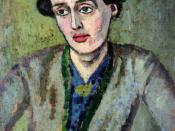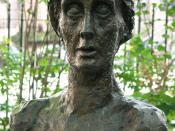A FREUDIAN PERSPECTIVE OF
A HAUNTED HOUSE
By CÃÂtÃÂlina Ciauà Â
'The writer, who has many liberties, may choose as he/she wishes the scene of action: the real world or a world which is more or less further from the former. The reader follows him/her in both cases'. Nevertheless one finds it difficult to follow Virginia Woolf in her world of fiction, because of her cripted style, especially in stories such as A Haunted House. 'Virginia Woolf's generation grew up in an environment of ideas made up of Russian literature and Freud's psychoanalysis, of French Post-Impressionist painting and G. B. Moore's philosophy. In this context the author felt the need of redefining reality as the source of fiction'. Woolf rebels against the Victorian way of writing, against the necessity of providing plot, comedy and tragedy and turns to inner-reality, to stream of consciousness, to new techniques of expressing fiction: 'Stream of consciousness fiction depends on the principles of the psychological free association attempting to show how counsciuousness reacts to various stimuli that stir a person's memory, imagination or senses.
To do that, other devices are necessary, like the suspension of mental content according to the laws of psychological association, the representation of discontinuity and compression by standard rhetorical figures and the suggestion of multiple levels of meaning by images and symbols'
All these elements are to be met in Woolf's A Haunted House, a metafiction that tackles the complexity of human mind with reference to the fiction and the condition of the writer. However, the symbolistic of the story makes it difficult for the reader to decode the message if one does not take into consideration the modernist author's interest in the psychological aspects of characters and the basic elements of psychoanalysis.
In his studies on the interpretation of...


